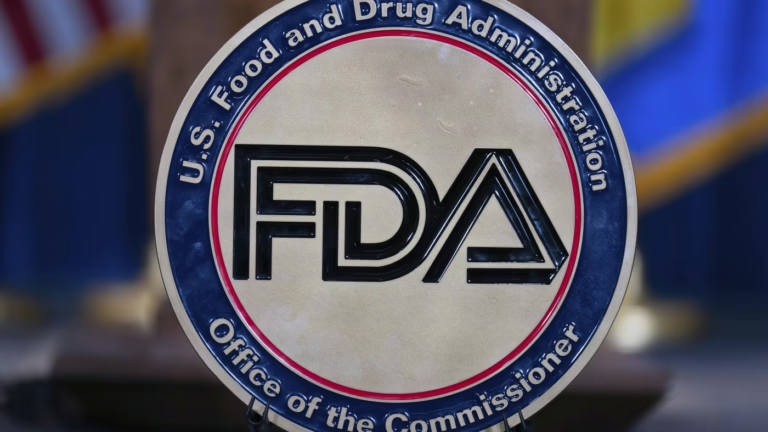The Food and Drug Administration seal displayed at the Hubert Humphrey Building Auditorium in Washington, D.C., on April 22, 2025.
Jose Luis Magana/AP
WASHINGTON – The Food and Drug Administration (FDA) has recently authorized an additional generic version of the abortion medication mifepristone, a procedural approval that swiftly sparked criticism from anti-abortion advocates and political figures associated with the Trump era.
Evita Solutions, the pharmaceutical company behind this affordable alternative, announced on its website that the FDA has granted approval for their version of the pill, which is indicated for terminating pregnancies up to 10 weeks.
Students for Life Action, a prominent anti-abortion organization, condemned the FDA’s decision in a statement released Thursday, branding it “a blemish on the Trump administration‘s legacy and further evidence that the entrenched bureaucracy within the FDA must be dismantled.”
Missouri Senator Josh Hawley, a Republican, also voiced his disapproval on the social media platform X, declaring, “My trust in the FDA’s leadership has been completely eroded.”
An FDA representative clarified that the agency “possesses very limited authority when it comes to approving generic medications” and emphasized that the FDA does not officially endorse any specific product.
This backlash emerges amid mounting pressure on top health officials from the Trump administration, including Health Secretary Robert F. Kennedy Jr., by abortion opponents demanding a reassessment of mifepristone’s safety. The drug, first approved a quarter-century ago, has consistently been validated as safe and effective by FDA scientists.
Last month, Kennedy and FDA Commissioner Dr. Marty Makary committed in a letter to Republican state attorneys general to undertake a comprehensive safety review of mifepristone.
Under the leadership of Makary and Kennedy, the FDA has postponed several vaccine-related decisions, notably tightening the approval criteria for this year’s COVID-19 vaccines-a level of political involvement that contrasts with the agency’s traditional reliance on career scientists for such determinations.
The FDA initially approved mifepristone in 2000 and has progressively expanded access, including the 2019 approval of the first generic version by GenBioPro.
In 2021, during President Joe Biden’s administration, the FDA authorized online prescriptions and mail delivery of the medication, significantly broadening its availability-a move that has faced ongoing opposition from abortion critics.
Typically, the FDA’s approval of generic drugs is a routine process, with multiple equivalent versions entering the market once the original patent expires. Generic manufacturers generally need only demonstrate that their product matches the original drug’s composition and formulation.
Mini Timmaraju of Reproductive Freedom for All remarked, “This is precisely how the system is designed to function, and it has operated this way for decades. The FDA’s career scientists and civil servants fulfilled their responsibilities.”
While the FDA usually processes such applications within about 10 months, records on the agency’s website reveal that Evita Solutions submitted its application to market mifepristone four years ago.
Evita Solutions states on its website that it “advocates for universal access to safe, affordable, high-quality, effective, and compassionate abortion care.”
The company confirmed via email that it plans to release the drug in January of the upcoming year.
The introduction of a second generic version is unlikely to significantly alter access to mifepristone, which is commonly used alongside misoprostol. Together, these medications account for approximately two-thirds of abortions in the United States. Mifepristone works by blocking progesterone and softening the cervix, while misoprostol induces uterine contractions to complete the process.
Access to mifepristone remains limited in many regions due to state laws that either ban abortion outright-including medication abortions-or impose specific restrictions on the drug’s use. Numerous legal challenges to these laws are currently progressing through the courts.
Major medical organizations, such as the American Medical Association, do not support restrictions on mifepristone.






















